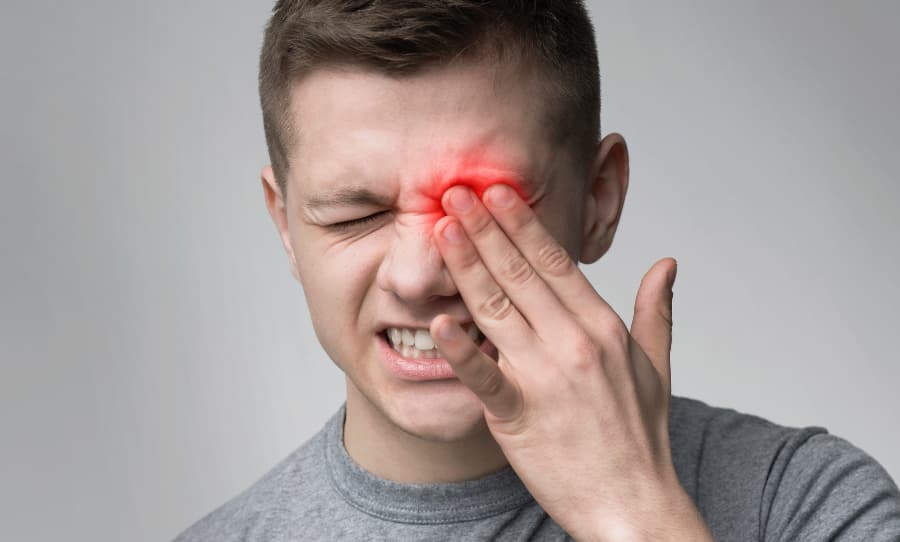How Head Injuries Cause Eye Problems and What to Do
Blows to the head, concussions, and other head injuries can cause damage to your brain and vision. These minor traumatic brain injuries (TBIs) can have lasting effects if you don’t receive prompt treatment. Even whiplash from a car accident can lead to vision complications and impairment, including blurred vision and light sensitivity.
Savedoff, Ciccone & Davis, Doctors of Optometry, P.C. provide comprehensive vision services for patients experiencing eye problems after a head injury. Patients can receive professional post-trauma vision care at our Manlius and Syracuse, New York, locations. Here, we discuss the link between head injuries and eye problems and how to treat vision impairment after a TBI.
Common Brain Injuries
The most common type of brain injury is a concussion, especially among athletes. However, non-athletes can also become concussed due to an incidental bump, blow, or jolt. This unexpected jostling causes the brain to move back and forth, causing its tissue to stretch and change shape while damaging brain cells. During a concussion or other head injury, the brain may also experience changes to its chemistry. This metabolic change can lead to brain cells having communication difficulties.
Most head injuries are the result of a sports injury or a slip and fall, but they can also be caused by whiplash injuries, often from car accidents. Other TBIs include hematomas (bleeding in the brain), contusions, or skull fractures.
Symptoms of a Brain Injury
Even though there is a lot of stress on the brain during an impact, most people who suffer a concussion or other minor brain injury don’t lose consciousness. Additionally, there may not be bleeding or other external signs of a head injury. Serious brain injuries such as bleeding in the brain, contusions, and fractures show up on X-rays, MRIs, and CT imaging.
However, concussions do not, which is why understanding the signs and symptoms is important. Common signs of a concussion include:
- Amnesia
- Delayed responses
- Glazed eyes
- Loss of balance
- Uncontrollable crying or laughter
- Vomiting
- Confusion
Other mild head injuries can also lead to symptoms like headache, dizziness, nausea, difficulty concentrating, and light sensitivity. If you experience any of these symptoms, you must seek medical attention right away so a qualified doctor can make an accurate diagnosis.
How Head Injuries Impact Your Vision
The unexpected movement of your brain from a head injury can cause your brain cells to have difficulty functioning and communicating. This can lead to temporary or lasting vision problems, especially if there is damage to the optic nerve. In most cases, vision-related symptoms are caused by communication issues between the brain and the vision system. After a head injury, you may have vision-related symptoms, including:
- Double or blurred vision: Also known as convergence insufficiency, this happens when your eyes are unable to work together to focus on nearby objects. It may also cause dizziness, poor balance, difficulty reading, or eyestrain.
- Light sensitivity: Photophobia can be caused by injuries to pain-sensitive areas in your brain. Light sensitivity may have a significant impact on your daily life, making it difficult to work, run errands, or do basic household tasks without pain.
- Ocular pain: Head injuries can cause the muscles around your eyes to contract. This contraction or shape change creates a dull ache or stabbing pain around your eyes.
- Abnormal eye movements: Concussions can make it difficult for you to focus on or track moving objects. You may also notice that you have a tough time switching between looking at one object and another.
- Motion sensitivity: In addition to light sensitivity, concussions and other brain injuries can lead to motion sensitivity. You may feel disoriented or uneasy in busy environments due to the brain’s inability to process complex external stimuli.
These symptoms are known as post-trauma vision syndrome. This condition interferes with your brain’s ability to process visual information and requires treatment to help prevent long-term complications and damage.
Resolving Eye Problems After a Head Injury
If you’re experiencing any of these symptoms, schedule an eye health exam with one of the qualified optometrists at Savedoff, Ciccone & Davis, Doctors of Optometry, P.C. If your vision concerns last more than six weeks, you’ll most likely need vision therapy to help your vision return to normal.
Healthcare providers and eye experts recommend vision therapy as the course of action following concussions or other brain injuries. Performed under the supervision of a qualified optometrist, this therapy targets your eye muscles and the regions of your brain that process visual information. This treatment involves eye exercises to strengthen the muscles in your vision system, enhance visual skills, and improve eye functioning.
If you have eye problems after a head injury, don’t wait to get seen. Trust the compassionate professionals at Savedoff, Ciccone & Davis, Doctors of Optometry, P.C. Our highly skilled optometrists address vision concerns through our comprehensive services, including post-concussion therapy, optical prescriptions, and eye health exams. We can help restore your vision and prevent serious complications. For more information about our post-concussion care, contact us today.



